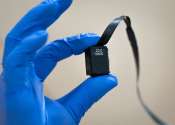Last update:
Neuroscience news
Diseases, Conditions, Syndromes
Subjective visual vertical test has low sensitivity for identifying Meniere disease
The subjective visual vertical (SVV) test has relatively low sensitivity for diagnosing Meniere disease, according to a study published in the July and August issue of the Iranian Journal of Otorhinolaryngology.
1 hour ago
0
0
Medical research
White matter may aid recovery from spinal cord injuries: Study
Injuries, infection and inflammatory diseases that damage the spinal cord can lead to intractable pain and disability. Some degree of recovery may be possible. The question is, how best to stimulate the regrowth and healing ...
16 hours ago
0
78
Brain activity associated with specific words is mirrored between speaker and listener during a conversation, data show
When two people interact, their brain activity becomes synchronized, but it was unclear until now to what extent this "brain-to-brain coupling" is due to linguistic information or other factors, such as body language or tone ...
19 hours ago
1
76

Storing memories without destroying previous ones
The brain is constantly storing new experiences that it has to integrate into the jumble of existing memories. Surprisingly, it does not overwrite previous memory traces in the process.
22 hours ago
0
62

Researchers develop promising therapy treatment that can kill glioblastoma cells in newly-discovered brain pathway
A new pathway that is used by cancer cells to infiltrate the brain has been discovered by a team of Canadian and American research groups led by the Singh Lab at McMaster University. The research also reveals a new therapy ...
Aug 2, 2024
0
14

With new technique, patient-derived neurons accurately model late-onset Alzheimer's disease
Researchers at Washington University School of Medicine in St. Louis have developed a way to capture the effects of aging in the development of Alzheimer's disease. They devised a method to study aged neurons in the lab without ...
Aug 1, 2024
0
84

Researchers determine how the hippocampus generates and sustains oscillations
RIKEN neuroscientists have gained new insights into how the hippocampus generates and sustains oscillations, which will be helpful for informing models on how the brain region works.
Aug 1, 2024
0
67

New insights into cellular processes after a stroke
Strokes lead to irreversible damage to the brain and are one of the most common causes of dependency or death. As the cellular reactions to a cerebral infarction are not yet fully understood, there are no current techniques ...
Aug 1, 2024
0
55

New insights into fruit fly cell regulation may offer clues for treating brain tumors
Peter Mac researchers have discovered new insights into neural stem cell development in fruit flies that may provide answers on how brain tumors grow in humans.
Aug 1, 2024
0
3

How astrocytes and perineuronal nets cooperate to sustain synaptic homeostasis
Synapses are small gaps between neurons through which signals are transmitted. This transmission of signals is what allows neurons to communicate and ultimately produce complex internal processes, such as thoughts and feelings, ...

Propofol shows promise in treating epilepsy by targeting HCN1 channels
The general anesthetic propofol may hold the keys to developing new treatment strategies for epilepsy and other neurological disorders, according to a study led by researchers at Weill Cornell Medicine and Sweden's Linköping ...
Jul 31, 2024
0
18

Study uncovers unique brain plasticity in people born blind
A study led by Georgetown University neuroscientists reveals that the part of the brain that receives and processes visual information in sighted people develops a unique connectivity pattern in people born blind. They say ...
Jul 31, 2024
0
48

How adaptable to psychosocial stress is the teenage brain?
Mental illness often occurs for the first time during puberty and in young adulthood. This is because during adolescent brain development, a pronounced remodeling of cognitive networks takes place.
Jul 31, 2024
0
15

Are cardiovascular risk factors linked to migraine?
Having high blood pressure, specifically high diastolic blood pressure, was linked to a slightly higher odds of ever having migraine in female participants, according to a new study published in the July 31, 2024, online ...
Jul 31, 2024
0
0

Skin may hold key to neurodevelopmental disorder diagnoses
A genetic diagnostic method using a small sample of skin from the upper arm could identify rare neurodevelopmental disorders in a non-invasive way, according to researchers at the University of Adelaide.
Jul 31, 2024
0
0

New high-resolution 3D maps show how the brain's blood vessels change with age
Healthy blood vessels matter for more than just heart health. Vascular well-being is critical for brain health and potentially in addressing age-related cognitive decline and neurodegenerative disorders, like Alzheimer's ...
Jul 30, 2024
0
39
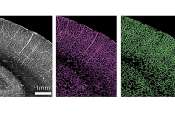
New work focuses on lack of TIMP-1 expression in the brains of MS patients
with a close family member living with multiple sclerosis Stephen J. Crocker, Ph.D., associate professor of neuroscience and immunology at UConn School of Medicine, takes his research personally.
Jul 30, 2024
0
37
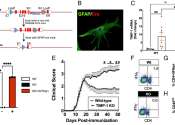
Bilateral focused ultrasound shown to be safe, effective for patients with lingering or severe essential tremor
In a study published in JAMA Neurology co-authored by Vibhor Krishna, MD, associate professor of neurosurgery at the UNC School of Medicine, researchers found that a staged bilateral focused ultrasound treatment for essential ...
Jul 30, 2024
0
66

Neurons in the frontal cortex help macaque monkeys decode social interactions, study shows
By studying the brains of macaque monkeys during turn-taking exercises, researchers may be one step closer to understanding how individual neurons in the frontal cortex work together to analyze spatial locations of other ...
Jul 30, 2024
0
24
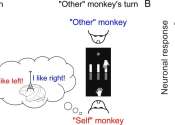
Study finds genetic variant among people who experience a rare recovery from ALS
Though it is exceedingly rare, some people diagnosed with amyotrophic lateral sclerosis (ALS) partially or fully recover from the lethal neurodegenerative disease.
Jul 30, 2024
0
2

Just a Minute: Avoiding 'brain fry' key to success on popular Radio 4 gameshow
Comedian Paul Merton and a Cardiff University academic have investigated why Radio 4 program "Just a Minute" is so challenging for players.
Jul 30, 2024
0
3

Spatial pattern of pathological changes in the brain can help identify dementia vulnerability early
Findings from a novel study in Biological Psychiatry: Cognitive Neuroscience and Neuroimaging, suggest that using a specialized diffusion weighted MRI scan to monitor the spatial pattern of individual cortical microstructural ...
Jul 30, 2024
0
0

Brain cell grafts in monkeys jump-start human trial for new Parkinson's treatment
People with Parkinson's disease are receiving a new treatment in a clinical trial started after University of Wisconsin–Madison scientists demonstrated the safety and feasibility of the therapeutic delivery method in a ...
Jul 29, 2024
0
61
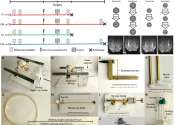
Advanced 'Parkinson's in a dish' model accelerates brain disease research
Researchers at Brigham and Women's Hospital, a founding member of the Mass General Brigham health care system, have developed a model that rapidly converts stem cells to brain cells with protein structures characteristic ...
Jul 29, 2024
0
19

Non-invasive device uses magnetoneurography to record involuntary nervous system
A research team led by UC San Diego has, for the first time, shown that a wearable, non-invasive device can measure activity in human cervical nerves in clinical settings.
Jul 29, 2024
0
60
